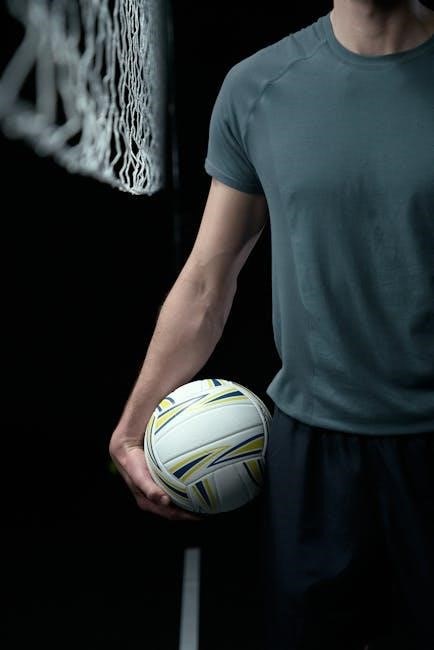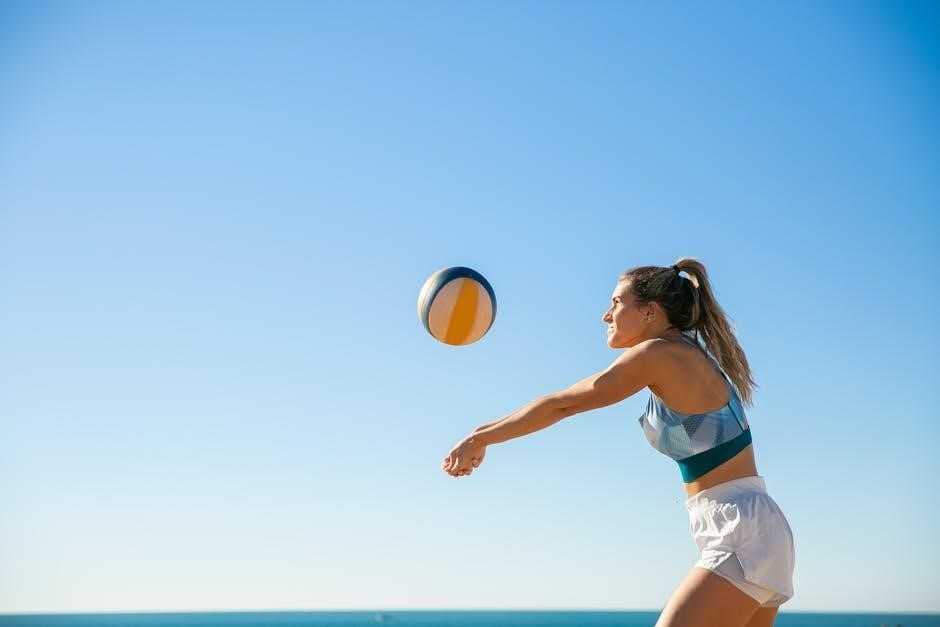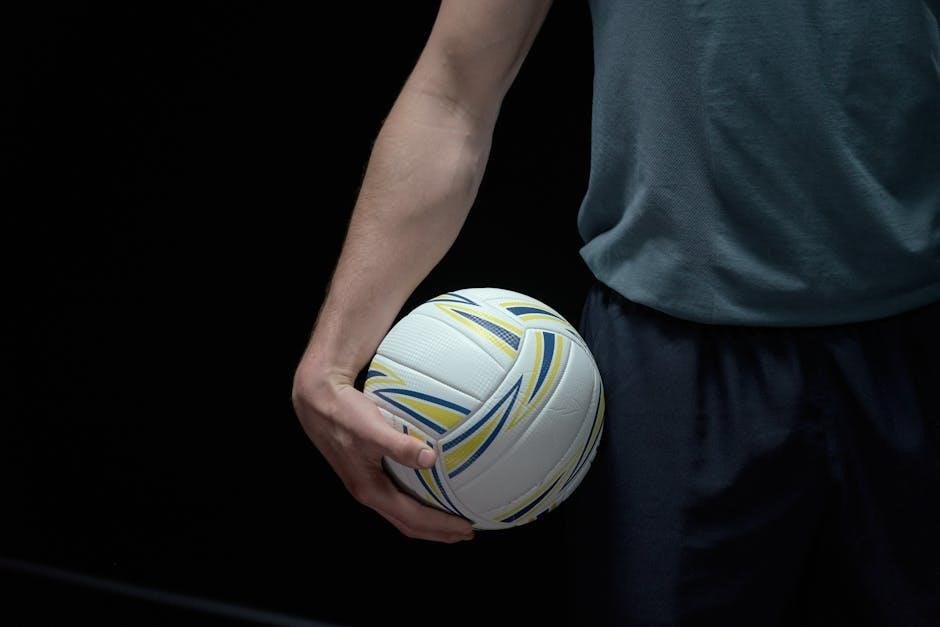The 2023 NFHS Volleyball Rules provide updated guidelines for safe and fair play, emphasizing rule changes, coaching zones, jewelry restrictions, and uniform requirements to enhance the game experience.
Overview of the NFHS Volleyball Rules
The 2023 NFHS Volleyball Rules outline comprehensive guidelines for high school volleyball, ensuring fair play, safety, and consistency. These rules cover uniform requirements, game procedures, and equipment standards, while addressing coach and player conduct. Key updates include coaching zone restrictions, jewelry limitations, and uniform number visibility. Safety protocols and injury management are emphasized, along with clear penalties for unsportsmanlike behavior. The rules also detail scoring systems, match lengths, and timeout regulations. By balancing tradition with innovation, the NFHS ensures a structured and enjoyable game environment for all participants. PDF resources are available for detailed review.
Importance of Understanding the Rules
Understanding the 2023 NFHS Volleyball Rules is crucial for players, coaches, and officials to ensure fair play and safety. Compliance with updated regulations prevents penalties and fosters a competitive environment. Familiarity with rule changes, such as coaching zones and jewelry restrictions, helps maintain order and consistency. Clear guidelines on uniforms, equipment, and game procedures reduce misunderstandings, enhancing the overall experience. By adhering to these rules, participants contribute to a respectful and structured game, aligning with the NFHS mission to promote education through athletics. Staying informed ensures everyone can focus on the game’s spirit and sportsmanship.

Rule Changes for the 2023 Season
The 2023 NFHS Volleyball Rules introduced key updates, including coaching zone definitions, jewelry restrictions above the chin, and uniform number visibility requirements to enhance clarity and consistency.
Coaching Zone Regulations
The 2023 NFHS Volleyball Rules introduced a defined coaching zone, extending beyond the libero replacement zone to the end line. Coaches are restricted to this area during play. Only one assistant coach may stand and instruct players during dead balls. This rule aims to reduce distractions and maintain order. The coaching zone is clearly marked, ensuring consistent enforcement. Coaches must remain within this zone to avoid penalties. This change promotes fair play and streamlines communication, enhancing the overall game experience for players and officials alike. The coaching zone regulations are a key focus of the updated rules.
Jewelry Restrictions
The 2023 NFHS Volleyball Rules enforce strict jewelry restrictions for player safety. No jewelry is allowed below the chin, including earrings, necklaces, or bracelets. Small, secured stud or post jewelry above the chin is permitted if it does not pose a risk. Industrial ear piercings and ear-stretching gauges are prohibited. These rules ensure consistency and minimize injury risks during play. Players found non-compliant may face penalties or be required to remove the jewelry before participating. This policy aligns with safety standards and maintains fair play across all competitions. Proper adherence is essential for compliance with the updated regulations.
Uniform Number Requirements
The 2023 NFHS Volleyball Rules specify that uniform numbers must be clearly visible and contrast with the color of the uniform top. Numbers should be at least 6 inches high on the back and 4 inches high on the front. Libero players must have a contrasting color for their number, ensuring visibility. These requirements ensure consistency and fairness, allowing officials and spectators to easily identify players during competition. Proper numbering is essential for compliance with the updated regulations and maintaining the integrity of the game. Teams must adhere to these standards to avoid penalties or disqualification.
Host School Responsibilities
Host schools are responsible for ensuring the playing environment meets NFHS standards, including proper court markings, net height, and equipment safety. They must provide a clean, safe facility with adequate lighting and seating. Host schools are also required to supply a scoreboard, first aid kit, and ensure emergency medical services are accessible. Additionally, they must manage crowd control and ensure fair treatment of all teams. Proper preparation and adherence to these responsibilities are crucial for a smooth and fair competition, as outlined in the 2023 NFHS Volleyball Rules. Compliance ensures a safe and enjoyable experience for all participants and spectators. Host schools play a vital role in maintaining the integrity of the game. They must also ensure that all necessary officials and equipment are present and prepared for the match. Failure to meet these requirements may result in penalties or postponement of the event. Host schools must also provide clear communication regarding game schedules and any specific venue rules to visiting teams. This includes ensuring that the court is free from hazards and that all necessary safety protocols are in place. By fulfilling these responsibilities, host schools contribute to a positive and organized volleyball competition. The NFHS emphasizes the importance of these duties to ensure fairness and safety for all participants. Host schools must also ensure that the playing surface is clean and dry to prevent injuries. Proper management of the facility and adherence to the rules are essential for a successful event. Host schools must also ensure that all necessary equipment, such as balls and scorekeeping materials, are available and in good condition. This ensures that the game can proceed without unnecessary delays or interruptions. Overall, the host school’s role is critical in maintaining the high standards set by the NFHS for volleyball competitions. They must be proactive in addressing any potential issues and ensure that all aspects of the event are well-coordinated. This includes working closely with officials, coaches, and players to create a positive and competitive environment. Host schools must also ensure that all rules and regulations are clearly communicated to everyone involved, including spectators. This helps to maintain order and respect throughout the event. By taking these steps, host schools can help to ensure that the competition is both enjoyable and fair for all participants. The NFHS provides detailed guidelines to help host schools fulfill their responsibilities effectively. These guidelines cover everything from facility preparation to emergency preparedness, ensuring that all aspects of the event are well-managed. Host schools must also ensure that the playing area is free from distractions and that the environment is conducive to fair play. This includes managing noise levels and ensuring that the court is clear of obstacles. By adhering to these guidelines, host schools can contribute to a successful and enjoyable volleyball competition. The NFHS relies on host schools to uphold the integrity of the game and ensure that all participants have a positive experience. Host schools must also ensure that all necessary documentation, such as rosters and rule books, is available and easily accessible. This helps to prevent disputes and ensures that the game runs smoothly. By fulfilling all these responsibilities, host schools play a key role in the success of NFHS volleyball competitions. They must be vigilant in their preparations and ensure that every detail is attended to, as outlined in the 2023 NFHS Volleyball Rules.

Uniform Requirements
Uniforms must comply with NFHS rules, including color consistency, logo size, and libero exceptions. Accessories are restricted, and all gear must meet safety standards.
Uniform Colors and Designs
Uniforms must adhere to specific color and design regulations. The predominant color of the uniform top must be consistent across the team, with contrasting numbers. Logos and flags are permitted but must meet size and placement requirements. Libero uniforms may differ in color but must remain consistent with the team’s overall design. Accessories like headbands and knee pads must match the predominant uniform color. These rules ensure visual consistency and fairness during competition, aligning with NFHS standards for player safety and game integrity.
Logo and Flag Specifications
Uniforms must feature a single logo and one American flag, each adhering to specific size requirements. The logo cannot exceed 2 1/4 inches, while the flag must measure 2×3 inches. Both designs must be approved and positioned on the uniform top. Multiple logos or flags are prohibited to maintain uniformity. These specifications ensure a professional appearance and prevent distractions during gameplay. The rules emphasize consistency and adherence to national standards, promoting a clean and respectful presentation of team identity while maintaining focus on the game itself. Host schools are responsible for verifying compliance with these design regulations.
Libero Uniform Exceptions
The libero’s uniform must differ from other players but maintain team color consistency. They can wear contrasting colored shorts or leggings, provided they align with the team’s uniform palette. The libero’s top must match the predominant color of the team’s uniform. Sleeves on the libero’s top must be the same length as other players’, except for long sleeves, which are prohibited if not worn by the team. The libero’s number must contrast with the uniform color for visibility, ensuring clear identification during play. These exceptions balance individual role requirements with team uniformity standards.
Accessories and Restrictions
Accessories must meet NFHS guidelines to ensure safety and fairness. Jewelry below the chin is prohibited, while small, secured studs or posts above the chin are permitted. Hair control devices must be soft and pliable to avoid injury. Eyewear, if worn, must be securely fastened. These restrictions maintain a consistent and safe environment for all players, aligning with the overall goal of promoting fair play and athlete well-being in the 2023 season.

Equipment Specifications
NFHS specifies volleyball dimensions, weight, and net height for consistency. The ball must meet size and weight standards, while nets have precise markings and height requirements.
Volleyball Dimensions and Weight
The official volleyball must meet specific size and weight requirements. For women’s and girls’ competitions, the ball’s circumference should be between 25 and 26.5 inches, weighing 9.9 to 10.6 ounces. Men’s and boys’ volleyballs have a slightly larger circumference, ranging from 25.5 to 26.75 inches, with a weight of 10.6 to 11.4 ounces. The ball must have a leather or synthetic cover and maintain consistent bounce and air pressure. These standards ensure fair play and safety, adhering to NFHS regulations for all high school matches.
Net Height and Markings
The official net height for high school volleyball is 7 feet 4 inches for men and 7 feet for women. The net must be securely fastened and extend 1 inch above the center line of the court. Markings include a 2-inch-wide center line and two 8-inch-wide antennas placed vertically on each side of the net. The antennas must align with the center line and extend above the net. These specifications ensure consistent play and safety, adhering to NFHS standards for all matches. Proper net setup is crucial for fair competition and player safety.
Player Gear and Accessories
Player gear and accessories in NFHS volleyball must meet specific standards for safety and fairness. Jewelry is restricted, with only small, secured studs or posts allowed above the chin; no jewelry is permitted below the chin. Uniforms must be like-colored, with libero uniforms having distinct exceptions. Knee pads and elbow sleeves are allowed but must not pose a risk to player safety. Hair control devices and headbands must be soft and non-abrasive. Accessories like undergarments must be uniform in color and design. These rules ensure consistency and safety while maintaining the integrity of the game, as outlined in the NFHS Volleyball Rules 2023 PDF guidelines.

Game Procedures
Game procedures include pre-game warm-ups, substitutions, timeouts, and let serves. Teams have five minutes for warm-ups, substitutions are recorded, and timeouts are limited to two per set. The let serve rule allows the ball to touch the net, ensuring continuous play. These rules maintain game flow and fairness, as detailed in the 2023 NFHS Volleyball Rules PDF.
Pre-Game Warm-Ups
Pre-game warm-ups are essential for player preparation and safety. Teams are allocated five minutes for on-court warm-ups, which include light exercises, stretching, and ball handling drills. The rules specify that warm-ups must be conducted within the designated court area and supervised by officials to ensure safety and fair play. Proper warm-up procedures help prevent injuries and prepare players mentally and physically for competition. The 2023 NFHS Volleyball Rules emphasize the importance of adhering to time limits and maintaining order during this critical phase of the game.
Start of Play
The game begins with the referee’s whistle, signaling the first serve. Teams must align according to the rotation order, with players positioned behind the respective lines. The serving team initiates play, while the opposing team prepares to receive. Proper alignment and adherence to rotational rules are crucial to ensure fair play. Officials monitor the start of play to enforce rules and maintain order. The 2023 NFHS Volleyball Rules emphasize the importance of accurate positioning and timely starts to ensure a smooth and competitive game flow. Compliance with these procedures is essential for a fair and enjoyable match.
Substitutions and Rotations
Substitutions and rotations in 2023 NFHS Volleyball Rules must follow strict protocols to ensure fair play. Rule 12-2-5 outlines that substitutions occur through the designated zone, with players entering and exiting correctly. The libero replacement zone has been extended, aligning with the coaching zone boundaries. Coaches are allowed only one assistant to stand during dead balls to instruct players. Proper rotational order must be maintained, and any improper substitution results in penalties. These rules aim to streamline gameplay and ensure compliance, with referees closely monitoring substitutions to maintain the integrity of the match. Adherence is crucial for a fair and competitive environment.
Timeouts and Intervals
Timeouts and intervals in 2023 NFHS Volleyball Rules are strictly regulated to maintain game flow. Each team is allowed two timeouts per set, each lasting 30 seconds. Timeout requests must be made through hand signals to the referee. Coaching staff can address players during these intervals but must remain within the designated coaching zone. Only one assistant coach is permitted to stand and instruct players during dead balls. Proper communication and adherence to timeout procedures ensure efficient gameplay. These rules prevent delays and promote fair competition, keeping the game dynamic and focused on player performance.
Let Serve Rule
The Let Serve Rule in the 2023 NFHS Volleyball Rules allows the ball to land on the opponent’s court without being touched, provided it doesn’t interfere with play. This rule aims to reduce unnecessary stoppages and promote continuous gameplay. The let serve is fair to both teams and ensures that the flow of the match remains uninterrupted. Proper communication between players and officials is crucial to enforce this rule effectively. It contributes to a smoother and more dynamic game, aligning with the overall objective of maintaining fair and enjoyable competition. This rule is consistently applied across all levels of play.

Scoring and Timing
The 2023 NFHS Volleyball Rules outline a point system where a point is awarded for each rally won, with matches typically best 3 out of 5 sets. Time intervals between sets ensure efficient gameplay.
Point System and Scoring
The 2023 NFHS Volleyball Rules maintain a rally scoring system, where a point is awarded to the winning team of each rally. Matches are typically played as best 3 out of 5 sets. Each set must be won by at least a 2-point advantage, with no cap on the maximum score; The point system emphasizes fair play and competitive balance, ensuring that every rally contributes directly to the overall score. This structure promotes strategic gameplay and maintains excitement throughout the match; Scoring rules are designed to be clear and consistent for all participants.
Match Length and Set Limits
A volleyball match under the 2023 NFHS Rules is typically played as a best-of-five sets format. Each set must be won by a minimum of 2 points, with no maximum score cap. Teams must win by at least a 2-point advantage, ensuring competitive balance. The match duration varies based on set lengths and timeouts. The NFHS rules emphasize fair play and efficient gameplay, with clear guidelines to prevent excessive delays. These set limits and winning margins ensure matches remain structured while allowing for exciting conclusions. The format promotes strategic play and maintains engagement throughout the competition.
Time Intervals Between Sets
Under the 2023 NFHS Volleyball Rules, teams are allotted a 3-minute intermission between sets. This interval allows players to rest, hydrate, and prepare for the next set. The timeout duration remains consistent across all levels of play, ensuring uniformity. Additionally, teams may receive a 15-minute halftime break if the match is split into multiple parts due to external factors like facility constraints. These intervals are designed to maintain player well-being and ensure smooth gameplay transitions. The NFHS rules emphasize efficient time management to keep the game flowing while providing adequate recovery time for athletes. This structure supports both performance and fairness.

Penalties and Fouls
Penalties and fouls are enforced to maintain fair play. Unsportsmanlike conduct, illegal moves, and rule violations result in penalties, impacting the game’s outcome and promoting sportsmanship. Referees enforce these rules strictly.
Unsportsmanlike Conduct
Unsportsmanlike conduct includes actions that undermine fair play, such as taunting, excessive celebrations, or deliberate disrespect toward opponents or officials. Coaches and players must avoid behavior that disrupts the game or shows disrespect. Referees enforce penalties, including warnings or disqualifications, to maintain sportsmanship. Rule 12, Section 2, Article 8C specifically addresses unsportsmanlike conduct by coaches attempting to influence referees’ decisions. Such actions are deemed unacceptable and result in penalties to uphold the integrity of the game. Proper conduct ensures a respectful and competitive environment for all participants;
Common Fouls and Penalties
Common fouls in volleyball include lifting, carrying, or throwing the ball, as well as touching the net during play. Penalties are enforced to maintain fair play and player safety. Repeated offenses may lead to warnings or disqualifications. Fouls such as reaching over the net or interfering with opponents’ movements are also addressed. These rules ensure a balanced and ethical game, aligning with NFHS guidelines to promote sportsmanship and competitive integrity. Proper understanding of these fouls helps players and coaches adhere to regulations, fostering a respectful and fair environment for all participants.
Jewelry-Related Penalties
The 2023 NFHS Volleyball Rules prohibit jewelry that poses a safety risk. Players are not allowed to wear jewelry below the chin, including earrings, necklaces, or bracelets. Exceptions are made for small, secure studs or posts above the chin. Failure to comply results in penalties, such as a warning or disqualification. Officials inspect players before the match to enforce this rule. These regulations prioritize player safety and maintain a fair, distraction-free environment. Proper adherence ensures smooth gameplay and aligns with the NFHS commitment to risk minimization in sports.

Roles and Responsibilities
The coaching staff, players, and referees each have distinct roles. Coaching staff guide strategy and player conduct, while players must follow rules and respect referees. Referees enforce rules and manage game flow.
Coaching Staff Duties
The coaching staff plays a vital role in ensuring compliance with 2023 NFHS Volleyball Rules. They are responsible for guiding players, developing strategies, and maintaining discipline. Coaches must stay within the designated coaching zone during matches, as defined by the libero replacement zone. They are also expected to manage substitutions, timeouts, and player rotations effectively. Additionally, coaches must adhere to rules regarding jewelry restrictions and ensure players’ uniforms meet 2023 regulations. Their leadership extends to promoting sportsmanship and ensuring player safety, making them integral to the game’s integrity and flow.
Coaches must also prepare for pre-game warm-ups and understand rule changes, such as updated host school responsibilities and uniform number requirements. Their adherence to these duties ensures a fair and organized game environment.
Player Conduct Expectations
Players are expected to exhibit sportsmanship and adhere to 2023 NFHS Volleyball Rules. They must respect referees, opponents, and teammates, avoiding unsportsmanlike conduct. This includes refraining from arguing calls, delaying the game, or engaging in disrespectful behavior. Players must follow rules regarding jewelry restrictions, with only small, secured studs allowed above the chin. They are also responsible for ensuring their uniforms meet all regulations, including proper numbers and designs. Proper conduct ensures a fair and respectful game environment, with penalties for violations such as yellow or red cards.
Players should also stay informed about rule changes.
Referee Authority
Referees hold absolute authority during NFHS volleyball matches, ensuring adherence to 2023 rules. Their decisions on fouls, penalties, and rule interpretations are final. Referees enforce unsportsmanlike conduct penalties, such as yellow or red cards, for actions like arguing calls or disrespecting opponents. They manage game flow, verify player eligibility, and oversee timeouts. Coaches and players must respect referees’ decisions, as outlined in NFHS guidelines. Referees also ensure proper equipment and uniform compliance, maintaining fair play and sportsmanship throughout the game. Their role is crucial for maintaining order and integrity in high school volleyball competitions.
Referees are trained to enforce all rule updates effectively.

Safety Protocols
The 2023 NFHS Volleyball Rules emphasize injury management, emergency preparedness, and safe environmental conditions to protect players and staff, ensuring a secure and healthy playing environment.
Injury Management
The 2023 NFHS Volleyball Rules outline clear protocols for managing injuries during games and practices. Teams must ensure immediate care for injured players, with trained staff providing first aid. Players must be removed from play if injured and only return after being cleared by medical personnel. The rules emphasize preventing injuries through proper warm-ups and equipment checks. Jewelry restrictions also aim to minimize injury risks. Coaches and trainers are encouraged to complete first aid and health safety certifications to effectively handle emergencies, ensuring player well-being remains a top priority throughout the season.
Emergency Preparedness
The 2023 NFHS Volleyball Rules stress the importance of having a detailed emergency action plan in place. This includes ensuring access to automated external defibrillators (AEDs) and first aid kits at all game and practice venues. Schools must communicate emergency procedures to staff, players, and officials, ensuring quick responses to medical situations. Coaches and trainers are encouraged to undergo CPR and AED certification to handle cardiac emergencies effectively. Regular drills and training sessions are recommended to prepare for unexpected incidents, prioritizing player safety and prompt medical intervention when needed.
Environmental Conditions
The 2023 NFHS Volleyball Rules address environmental conditions to ensure safe play. Courts must be free from hazards, with proper ventilation and lighting. Extreme temperatures or weather conditions, such as lightning for outdoor games, may necessitate delays or cancellations. Host schools are responsible for ensuring the playing surface is safe and meets regulations. Environmental factors that pose a risk to player safety must be mitigated promptly. These guidelines aim to protect athletes and staff while maintaining the integrity of the game under various environmental circumstances.

Training and Resources
The 2023 NFHS Volleyball Rules offer resources like rule clinics, online training materials, and certification renewal to ensure coaches, officials, and players stay informed and compliant with updated regulations.
Rule Clinics
Rule clinics are essential for understanding the 2023 NFHS Volleyball Rules. These annual events provide in-depth reviews of rule changes, such as coaching zones and jewelry restrictions. Clinics are designed for coaches, officials, and players to ensure compliance and improve game safety. They often feature live Q&A sessions and hands-on training. Many clinics are available in-person or virtually, with materials accessible via PDF downloads. Attending a rule clinic ensures participants are well-versed in the latest regulations, helping to maintain fair and consistent gameplay across all levels. Check the NFHS website for schedules and registration details.
Online Training Materials
The NFHS offers comprehensive online training materials for the 2023 volleyball rules, ensuring accessibility and convenience. These resources include PDF guides, PowerPoint presentations, and video tutorials, covering topics like coaching zones, uniform requirements, and jewelry restrictions. Coaches and officials can access these materials through the NFHS website, allowing for self-paced learning. The materials are regularly updated to reflect rule changes, ensuring everyone stays informed. They are an invaluable tool for understanding and implementing the latest regulations effectively. Utilize these resources to stay compliant and enhance your knowledge of the game.
Certification Renewal
Certification renewal for volleyball officials is essential to stay updated on the latest 2023 NFHS rules. The NFHS provides structured renewal programs, including online courses and in-person clinics, to ensure officials master new regulations. Renewal typically involves completing continuing education requirements and passing a rules exam. This process guarantees that officials maintain high standards of knowledge and fairness. Staying certified is crucial for ensuring consistent and accurate rule enforcement, benefiting both players and the integrity of the game. Regular renewal helps officials adapt to evolving rules and enhance their performance on the court.
The 2023 NFHS Volleyball Rules aim to enhance fairness, safety, and consistency. By understanding these updates, players, coaches, and officials ensure a competitive and enjoyable game environment.
Key Takeaways
The 2023 NFHS Volleyball Rules introduce significant updates to enhance gameplay fairness and safety. Key changes include the establishment of a defined coaching zone, stricter jewelry restrictions, and uniform requirements; Coaches must adhere to the new coaching zone boundaries, while players are limited to wearing small, secured jewelry above the chin. Uniforms must now have contrasting numbers and logos within specific size limits. These updates aim to improve consistency, reduce distractions, and ensure player safety. Understanding these rules is essential for coaches, players, and officials to maintain a fair and enjoyable competitive environment throughout the season.
Future of NFHS Volleyball Rules
The future of 2023 NFHS Volleyball Rules likely includes continued refinement of safety protocols and rule clarity. Technology integration, such as wearable devices and advanced equipment standards, may become more prominent. The NFHS will focus on maintaining consistency across all levels while adapting to evolving player needs. Annual updates will ensure the rules remain relevant, addressing emerging trends and player safety concerns. By prioritizing fairness, safety, and sportsmanship, the NFHS aims to sustain volleyball’s growth and appeal. Future changes will be communicated through rule clinics and online resources to keep stakeholders informed and prepared.
